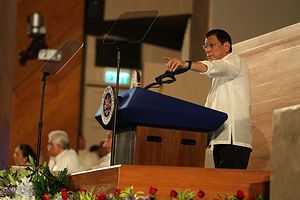The Philippine government has again had to leap into damage control, this time after President Rodrigo Duterte insulted his mainly Catholic constituency by calling God “stupid” and dismissing that cornerstone of Christianity: Adam and Eve.
Duterte has a well-earned reputation as a foul mouth, and, beyond rhetoric, his policies have also created uncomfortable realities, in particular his war on drugs which according to one report has claimed 20,000 lives.
But this time, he needlessly risked alienating the Philippine people when he reckoned with the spiritual soul of the nation he leads.
“Adam ate [the apple], then malice was born. Who is this stupid God? This son of a bitch is stupid if that’s the case,” Duterte reportedly told a technology summit in his hometown of Davao.
“You created something perfect and then you think of an event that would tempt and destroy the quality of your work,” was his summary of the Bible story.
Online media was awash with outrage from the faithful, already concerned by other religious-related events, such as the killings of three priests in seven months. One was shot dead inside his church, highlighting the violence that has long afflicted the Philippines.
In response, the Duterte administration charged a three-man committee to hold talks with the clergy as the president attempted to clarify his remarks, saying he was not talking about his God but was actually insulting the God of his critics. It didn’t help.
“What I said was your God is not my God because your God is stupid. Mine has a lot of common sense.”
In separate comments, Duterte denied persecution of the clergy, adding his government did not have a policy against priests: “As a matter of fact, I respect the church… The truth is, I cannot order the killing of priests, women, and children.”
He also added later that his comments were in part directed at the Australian nun Patricia Fox, superior of the Catholic Sisters of Our Lady of Sion, who has upset the president with her partisan politics and protests.
One presidential spokesman urged church leaders not to be so “onion-skinned” and noted that Duterte had previously complained about being abused by a priest as a child, and that this was at least in part behind his latest tirade.
Such complaints should not be taken lightly. Even Sister Fox acknowledged this, saying she understood Duterte’s pain and that: “The Church is made up of human beings and some of them do very bad things.”
But Duterte’s anger and potty-mouthed insults, directed at anyone he finds disagreeable, are still far from presidential.
He infamously reserved his favorite insult, “son of a whore,” for former U.S. President Barack Obama. Similar insults were hurled at Pope Francis and the European Union, he said, was “stupid” for its justified carping over his over his war on drugs.
And it’s that history, rather than just his latest insults, that has angered the clergy and needlessly alienated more of the Philippine people.
“Duterte’s tirade against God and the Bible reveals again that he is a psychological freak, a psychopath, an abnormal mind who should have not have been elected as president of our civilized and Christian nation,” Catholic bishop Arturo Bastes, said.
But at the end of the day, Duterte remains a politician, and it’s the numbers that matter.
Eighty percent of the Philippine population are Roman Catholic, and no doubt many have their own thoughts on God, Adam and Eve, and the merits of creationism. And that could prove decisive when Duterte needs their support.
Luke Hunt can be followed on twitter @lukeanthonyhunt.
































